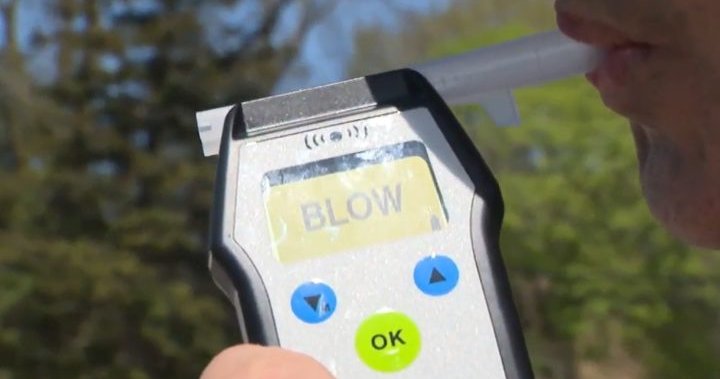Highways throughout southern Ontario will be busy this Victoria Day long weekend as residents mark the unofficial start to summer.
With what is traditionally a busy time on the roads, police throughout the region will be keeping an eye out for impaired drivers.
If travelling through the Greater Toronto Area, drivers should know that the Ontario Provincial Police recently announced a new policy aimed at combating impaired driving.
What is the new OPP policy?
The OPP announced that it will be demanding a breath sample any time its officers conduct a traffic stop on an OPP-patrolled highway in the Greater Toronto Area.
The service said it is using the full extent of Canada’s Mandatory Alcohol Screening (MAS), which was amended in 2018 to allow police to demand a breath test of any driver even in the absence of suspicion.
OPP Sgt. Kerry Schmidt said breath samples to check for alcohol will be required even if drivers are pulled over for speeding, using a cellphone or other offences.
The new measure is aimed at combating an increase in impaired driving offences that has been observed over the past several years, Schmidt said.
Can I refuse a breath sample?
In short, unless you want to be criminally charged, no.
“If you refuse, you’ll be arrested and charged,” Schmidt said.
Michael Engel, a defence lawyer who practices exclusively in impaired driving cases, said if a driver refuses to provide a breath sample, the consequences can be extensive.
“It’s as if you committed a full-blown offence of driving under the influence,” Engel told Global News.
“The fact of the refusal is criminalized and it carries with it the same penalties as if you had taken the test, failed that test, been taken to the station and failed another breathalyzer test.”
Engel said he currently has a couple of ongoing cases where his clients purport they didn’t have anything to drink but didn’t provide a breath sample.
“They found the whole demand offensive, the stop arbitrary, and they refused to comply with the demand and they were charged,” he said.
“I told them that in retrospect — I mean, hindsight’s always 20-20 — but certainly if you have not been consuming alcohol, or only in a modest amount, that you’re neither impaired nor over the legal limit, provide the sample and you’re on your way.”
Breaking news from Canada and around the world
sent to your email, as it happens.
Engel said if someone is charged with refusal, it’d be a difficult case to defend.
Ontario has a zero-tolerance law for young, novice and commercial drivers — they cannot have any alcohol in their system. This includes those under the age of 21; any driver of any age with a G1, G2, M1, or M2 licence; those driving a vehicle that requires an A-F licence or CVOR; or anyone driving a road-building machine.
Other drivers with a full G licence will face charges and/or penalties if their blood alcohol concentration level registers at 0.08 or more on a breathalyzer or if a driver falls within a warning range between 0.05 and 0.079.
“Driving is a privilege,” Schmidt said. “And we want to make sure that the drivers who are operating in vehicles are not impaired.”
Law has ‘surprisingly’ held up in court: Engel
Engel said he is not surprised by the new OPP measure and despite concerns having been raised about the law’s constitutionality, it has held up in court.
“When this legislation was initially introduced … there were real concerns by the defence bar that were raised with parliament, this issue of detaining motorists and compelling them to provide breath samples without reasonable suspicion,” he said.
“But, as it’s turned out, somewhat surprisingly, the legislation has been upheld through various constitutional challenges.
“So I’m not surprised, but it’s certainly an erosion of people’s civil liberties. But I guess that’s the cost we pay in terms of trying to keep the roads safe.”
Engel said the OPP wants to get the message out in the hope that a tragedy may be averted and that should be supported.
“But, you know, from my perspective, I’m concerned about the constitutional aspects of it and … to date, it’s been effectively upheld as being constitutional,” he said.
Meanwhile, on Wednesday, the Ford government also announced new proposed consequences for those found guilty of impaired driving in the province.
The province said that legislation will also “clarify police authority” to conduct sobriety checks.
“It’s an object of this government to give our police officers every tool necessary to be able to keep our roads safe,” Transportation Minister Prabmeet Sarkaria said on Wednesday. “And that is what we’re doing with this change as well.”

Will it reduce the number of impaired drivers?
Researcher Donald Redelmeier, who is a professor of medicine at the University of Toronto and a staff physician at Sunnybrook Health Sciences Centre, said the OPP’s new policy is “a step in the right direction.”
“Current rates of surveillance and enforcement are just too low,” he said.
He said alcohol contributes to around one-third of crashes in Canada.
In Australia, where police conduct random sobriety checkpoints more commonly, it “has worked pretty well … without inducing a lot of community backlash,” Redelmeier said.
“Current rates of drinking and driving are high in Canada, not quite as high as our American counterparts, but certainly much higher than our Australian counterparts,” he said.
Redelmeier said he thinks the OPP’s move could contribute to a reduction in the number of impaired drivers and safer roads.
Mothers Against Drunk Driving (MADD) certainly agrees.
The organization’s website says mandatory alcohol screening “is widely recognized as one of the most effective anti-impaired driving measures available.”
“More than four decades of international research illustrate the benefits of mandatory alcohol screening. It has been adopted in New Zealand, Australia and most European countries, and has helped to reduce overall road crashes and fatalities,” it says.
Redelmeier said that of course “good” policies can be taken to “draconian” extremes, but he believes officials here are “nowhere close to that.”
“What you’re doing on your own private property is your business,” he said.
“When driving, that’s a privilege, not a right. And that’s in the community where one small error can cause all sorts of damage to other people.”

Engel said he is not sure what impact the new measure will have.
The history of “increasingly severe” legislation regarding impaired driving and the rationale behind the OPP’s move shows “everything’s been tried to stem the carnage of drinking and driving, but there just doesn’t seem to be any effective deterrent,” he said.
Engel noted the Marco Muzzo case and said following that tragic incident in York Region, one would have thought it would reduce the number of impaired drivers.
Muzzo drove drunk and killed three children and their grandfather in Vaughan in a 2015 crash. The children’s grandmother and great-grandmother were also badly injured.
“One would think that after a tragedy like that, that people would get the message that it’s not good to drink and drive,” he said.
“But … what they discovered is that this type of tragedy hasn’t reduced drinking and driving. It just continues unabated.”
Engel said it’s reasonable to think that people would think twice about driving impaired following an announcement like the OPP’s, but to date, nothing has had a major impact.
He said it will be interesting to see what effect, if any, the measure has on the number of impaired driving cases.
Despite the continuation of impaired driving offences amid evolving laws and awareness efforts, MADD believes that mandatory tests could result in “significant and sustained reductions in overall road crashes and fatalities.”
— with files from Gabby Rodrigues and Caryn Lieberman





